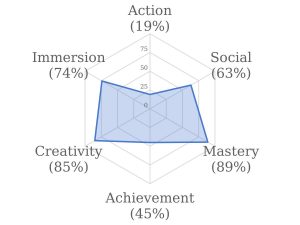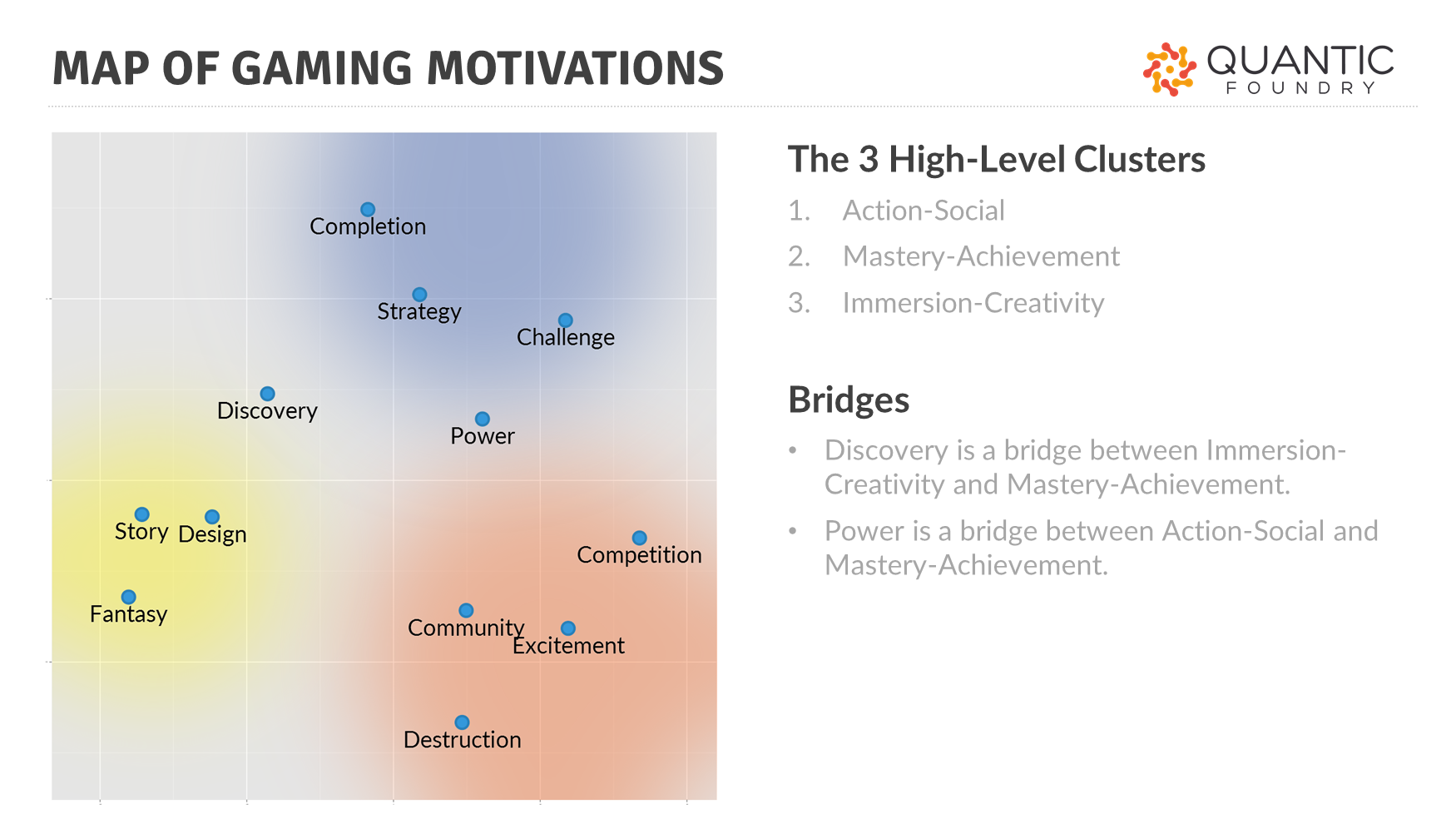
Over the winter holidays, we wrote about game analytics consulting firm Quantic Foundry, which has published what it calls its “Gamer Motivation Model” — essentially, it’s an updated Bartle test for modern gamers that groups gamer types into three “clusters of motivations.” More recently, co-founder Dr. Nick Yee — yes, that Nick Yee — has discussed how gamer motivations align with personality traits.
In light of the fun we had taking the Bartle test a few months ago and the news that Bartle himself is publishing new books offering insight into our genre, we thought we’d take the Gamer Motivation test ourselves, share our results and our thoughts on the test, and provoke you to do the same.
Brendan Drain (@nyphur):
Calm, Proficient, Ambitious, Social, Immersed, and Creative
Action 29%, Immersion 17%, Achievement 55%, Mastery 92%, Creativity 90%, Social 95% [Link]
Wow, you can’t half tell I’m in EVE Online player with those scores; I clearly don’t value action or achievement very much and prefer difficult-to-master games that reward careful planning and social structure. The low Immersion score is a bit odd because I actually value immersion in a game’s world a lot, but this score reflects that I don’t really care about the NPC story in games (in fact, I only scored 2% in Story). I much prefer open-world games where you can become immersed in a well-constructed universe and make your own stories. The high Mastery and Creativity scores show that the types of game I’m drawn to are those with high difficulty and skill caps and that require some creative problem-solving, so it’s no surprise I’m drawn to and even developing a space 4X game.
Most of the time in MMOs I can be found figuring out the most efficient ways to build characters or trying to break the game mechanics, which has served me well in the past. Even in games that are relatively action-oriented like Diablo III, I found myself testing builds and figuring out how the maths of various mechanics actually worked under the hood rather than just following the conventional wisdom. The 95% Social score makes sense too as I’ve always felt games aren’t really worth playing unless you can share them with someone, be it playing directly with friends or just discussing the game on a forum and being part of an online community. All in all, I think this test is much better than the Bartle test and it does break down into further categories that make for some interesting reading, but it’s basically just a way of quantifying what we already know. There are no big revelations to be had here, the site basically asks us what kind of gamer we are and then tells us what kind of gamer we are. It is nice to have some numbers though :D.
Brianna Royce (@nbrianna, blog):
Analytical, Relaxed, Immersed, and Creative
Creativity 93%, Social 64%, Action 64%, Immersion 59%, Mastery 34%, Achievement 16% [Link]
I’m not entirely surprised by my results. I get obsessed with tinkering with games, with modding, with seeing what I can do, what happens if I click here, what can we see if we go there. I think I’ve actually become more that way over time; I began gaming as pure roleplayer, then became much more obsessed with “achieving” according to the game’s rules, and in the last few years I’ve become more focused on games as a tool and games as a toy. It’s always been about escapism, just different kinds, I suppose. I’d like to take the test again next week, next month, and see how much my answers change. Somehow when I got to the end of the test I felt as if it was too short, as if it hadn’t asked the questions it needed to ask to profile me because it didn’t really address my preferred gameplay combinations and lumped a lot of broad gameplay types together (how much does a “creative” who likes to write fanfic have in common with a “creative” who likes to test plugins or a “creative” who decorates in-game houses for real-world cash?). Did anyone else feel that way? And what about those descriptions of our qualities — did they seem so generic (and universally flattering) as to be tricking us with the Forer effect?
Eliot Lefebvre (@Eliot_Lefebvre, blog):
Action-Oriented, Analytical, Completionist, Gregarious, Deeply Immersed, and Creative
Immersion 90%, Creativity 81%, Action 70%, Mastery 58%, Achievement 53%, Social 46%
I said when we took the Bartle test that humans don’t really fit into a number of categories, and I still stand by it now; I think this test does a better job of defining someone’s overall preferences, but I don’t think it’s painting the whole picture so much as slices of the picture and how those slices interact with other slices. You’d think that I tend to be antisocial by those numbers, for example, when I’m an active roleplayer and tend to play a lot of games in which I have a very strong social component; it’s just not something that I consider a core element of whether or not the game is fun to play. You certainly wouldn’t expect me to be a longtime fan of the Sims series.
Then again, some of these stats are interesting to break down just the same. I wouldn’t call myself action-oriented so much as I would say that I want my gameplay to be fun by itself rather than tedious – I’m happy to click through day after day in the life of a Sim, as long as I’m having fun with each of those clicks. Similarly, I tend to be on the analytical side of things because I want to understand how these systems work independent of whether or not I feel like devoting the time necessary to mastering the systems in question. So there’s some interesting stuff to unpack, even if the categorization is another story.
Justin Olivetti (@Sypster, blog):
Calm, Spontaneous, Relaxed, Independent, Grounded, and Creative.
Action 10%, Social 11%, Mastery 13%, Achievement 19%, Creativity 74%, Immersion 34%
I wouldn’t argue about this — story, customization, and world environments are very important to me. I do enjoy chatting and achieving, but I guess those take a back seat to what I consider the backbone of MMOs (and all games, really) for me.
Larry Everett (@Shaddoe, blog):
Calm, Proficient, Relaxed, Social, Deeply Immersed, and Creative
Action 25%, Achievement 29%, Mastery 79%, Creativity 86%, Social 90%, Immersion 93% [Link]
I’ve always liked Nick Yee and his projects. His Daedalus project is one of my favorites because it focuses on MMOs. But this particular one focuses on gaming as a whole. It’s interesting when comparing it to Bartle’s Taxonomy. First, this is a more up-to-date test, but it’s missing some of the nuances that both the Daedalus and Bartle’s tests have. For instance, where do multiplayer games even fit in this test? And then you even break it down further and ask things like where to roleplayers or raiders or PvPers even fit into Quantic tests?
Those kinds of questions make me wonder if it’s even possible to use the results of this test practically. Can I use it to find like-minded gamers? Maybe, but with the focus on single-player, it’d be difficult to find a partner or group. As a developer, I could maybe use it to help create a game, but since it’s based on public opinion and not actual play-testing, it’d be difficult to know the usefulness of the results. One thing it does seem good for is finding that single-player game that might be a great fit for you.
MJ Guthrie (@MJ_Guthrie, blog):
Analytical, Completionist, Gregarious, Deeply Immersed, and Creative
Action 41%, Achievement 23%, Mastery 67%, Creativity 90%, Social 63%, Immersion 80%
If you take just the description that this test spits out, I think it feels fairly accurate. I liked how the questions had varying degrees of possible responses, acknowledging that there isn’t always (or even often) black-or-white, choose-door-one-or-door-two kind of answer to the questions. However, just like the Bartle test, I found this test to be ineffective at cornering your gaming personality in the percentages as displayed.
What is most curious is how those aggregate percentages were compiled from the individual ones. For instance, I got 91% for completion and 1% for power, and that somehow worked out to 23% for achievement? The same goes for my community score (97%) and my competition score (12%); how does this make me less social simply because I answered that I didn’t particularly like duels or beating other people? And someone please explain how on earth I of all people could score only 52% on story? How on earth is this test weighted? If I look at the broken-down components offered in the analysis, I think the results are a little more reflective.
Tina Lauro (@purpletinabeans):
Calm, Proficient, Completionist, Gregarious, Deeply Immersed, and Creative.
Mastery 89%, Creativity 85%, Immersion 74%, Social 63%, Achievement 45%, Action 19%. [Link]
 I looked closely at the buzzwords associated with each subsection to see if I would use those words to describe my playstyle, and I found that the test summed me up quite accurately. My breakdown in the plainest terms represents a playstyle that favours excitement over destruction, opts for a heavy strategic component paired with a moderate challenge, desires completion rather than power, and a community emphasis that far surpasses competition. This breakdown isn’t very surprising to me: I adore strategy games, social gameplay, and a solid challenge while I avoid heavy competition and power playing. I was perhaps a little bit shocked that the mastery and creativity sections were my highest scoring areas, particularly since I would always say that social aspects of gaming are the most important to me. I think it’s because competition was lumped under that banner, so my whopping 97% for community was heavily diluted by the 12% I scored in competition. I don’t feel that hating competitive games makes me less social, so I agree with MJ on that front.
I looked closely at the buzzwords associated with each subsection to see if I would use those words to describe my playstyle, and I found that the test summed me up quite accurately. My breakdown in the plainest terms represents a playstyle that favours excitement over destruction, opts for a heavy strategic component paired with a moderate challenge, desires completion rather than power, and a community emphasis that far surpasses competition. This breakdown isn’t very surprising to me: I adore strategy games, social gameplay, and a solid challenge while I avoid heavy competition and power playing. I was perhaps a little bit shocked that the mastery and creativity sections were my highest scoring areas, particularly since I would always say that social aspects of gaming are the most important to me. I think it’s because competition was lumped under that banner, so my whopping 97% for community was heavily diluted by the 12% I scored in competition. I don’t feel that hating competitive games makes me less social, so I agree with MJ on that front.
I’m really interested to see if the commenters and staff who scored similarly to me in the Bartle test also come out with a similar gaming profile in this test. Is Bartle too broad and rigid in the choices it presents? Will this test further distinguish the subtle differences between the many players contained within each of Bartle’s branches? The comments will most definitely be an interesting read here!
Patreon Donor Archebius:
Analytical, Relaxed, Social, Immersed, and Creative.
Action 37%, Social 73%, Mastery 49%, Achievement 7%, Creativity 90%, Immersion 62%
I agree with the big words at the top: I tend to enjoy games that are more strategic, I’m not very “competitive,” and I will play anything if I’m doing it with friends. If I’m alone, then it better suck me in! However, it does seem to be pretty harsh in how it assigns percentages. Immersion is very important to me, but not necessarily big sweeping stories and intricate backgrounds for every little kid looking for his ghost parents. Because it averages worldbuilding and storylines to get immersion, I feel like I got a much lower percentage than is accurate.
Overall though, pretty good for a snapshot of my preferences!
Your turn! You can take the test on the Quantic Foundry website. Yes, it’s free.
















